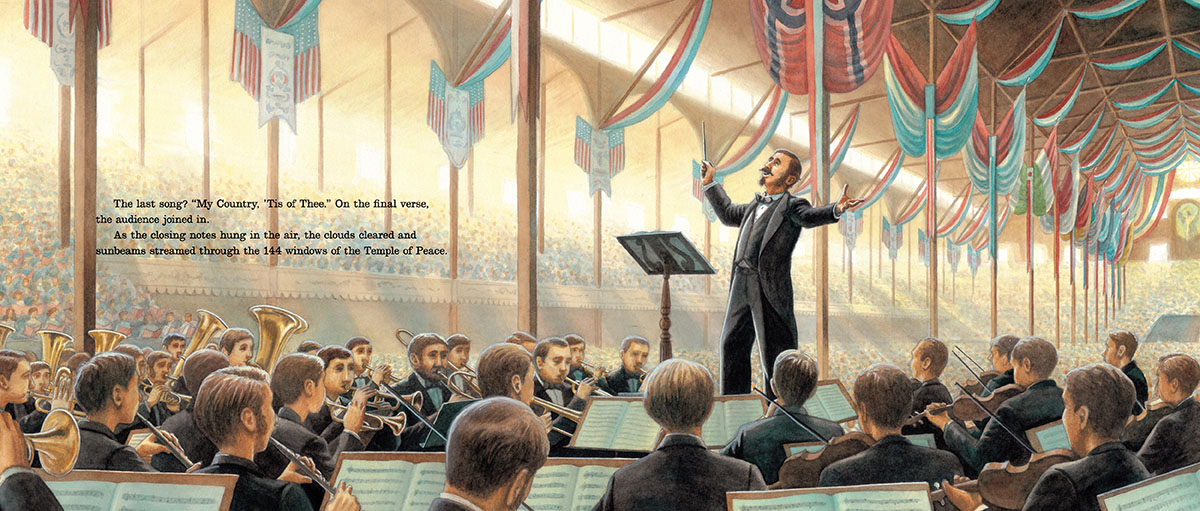Celebrating Boston’s ‘Jubilee,’ the Loudest Musical Event the City Has Ever Heard

Illustration copyright © 2014 by Matt Tavares. Reproduced by permission of the publisher, Candlewick Press, Somerville, Ma.
With her latest book, children’s author Alicia Potter is hoping to make some noise about a not-so-celebrated historical figure credited with bringing Boston’s annual July 4 celebrations to fruition, and casting an international spotlight on the city with his boisterous musical ensembles.
Patrick Sarsfield Gilmore, an Irish immigrant who served in the Civil War fighting for the Union, is considered to be the “father of the American concert band,” and Potter thinks that’s worthy of relaying the story of the composer’s life to a younger audience. To do this, Potter highlighted Gilmore’s approach to organizing one of the “biggest and loudest” concerts the world has ever seen. “Boston was the musical capital of the world at one time, and Gilmore had a lot of sway over that, and he helped it rise very quickly,” said Potter, whose illustrated book, Jubilee!: One Man’s Big, Bold, and Very, Very Loud Celebration of Peace, is out now.
Potter’s picture book, which was illustrated by artist Matt Tavares, details Gilmore’s efforts to put on the controversially loud “National Peace Jubilee” that was held in the Copley Square area in 1869. As history tells it, after Gilmore returned from the Civil War, where he used the power of music to lift the spirits of the troops, the city became the headquarters for a five-day music celebration that boasted 1,000 musicians, 10,000 vocalists, 12 cannons, 40 church bells, and a drum that echoed through the narrow streets. The event was housed in a coliseum that was specially built for the occasion. “It was a beautiful expression of music, and the largeness of it was artful. Seeing it grow into this huge spectacle was something that I thought kids could relate to and be inspired by,” said Potter, a longtime Boston resident.
While Gilmore was the mastermind behind an even larger extravaganza in 1872, called the “World Peace Jubilee,” an 18-day concert in Boston designed to celebrate the end of the Franco Prussian War, Potter’s book puts a microscope on the musical architect’s first big festival. “It took place in Copley Square, and it’s blocks away from where I live. It was a huge international thing,” she said.
Potter said a community newspaper article she saw in 2010 about the anniversary of the composer’s jubilee, which is on June 15, sparked her interest in Gilmore. After reading a book written by Gilmore that detailed the steps he took to organize the massive musical ceremony on Boston’s streets, and securing grant money through the Boston Public Library’s Children’s Writer-in-Residence Program, she decided instantly it would be her next project.
While the Boston Public Library and Boston College have retained historical artifacts and information about Gilmore’s impressive brass-and-string jubilee, Potter’s 40-page homage to Gilmore, which was published by Somerville-based Candlewick Press, adds some extra character to what actually happened and provides visually entertaining excerpts to go along with it. “He became more of a character for me, and I got a sense of his personality,” she said of the research and final version of the book. “The idea of the jubilee, where it’s big and it’s loud, I thought would really have an appeal for kids, too. You get a sense of his passion and resiliency in putting this together, and that’s something I hoped I could echo in the book.”
Potter said while her book calls attention to a little-discussed historical event, she wishes there were more out there celebrating the life of Gilmore. “It would be great to do something and have people realize that he started a lot of the music traditions we enjoy today,” she said. “Thinks it would be fun to have some sort of event to celebrate the day [on June 15]. People don’t realize the reach that Gilmore had. Just the idea that people would gather to hear his music…if you think of large concerts today, it’s where a lot of our traditions started.”


